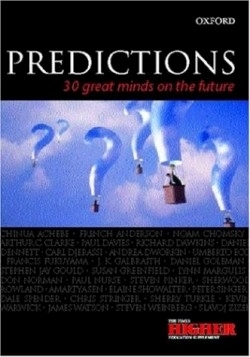
Predictions
Thirty Great Minds on the Future
Don’t fall in love with your own airship, warns Umberto Eco in his little section of this book. His warning, meant to evoke memories of those foolish days when inflatable aircraft were considered the future of aviation, is quoted in both the preface and the introduction to this book. The signal is clear: this is a cautious book. Intended to be a peek into the next century, it can as easily be read as a summary of the current state of affairs in a range of academic fields.
Sometimes the book is banal. Nigerian author Chinua Achebe says he is optimistic about the future of Africa, but warns there is work to be done. His piece, like several in the book, reads as though it was hurriedly written between other engagements. Noam Chomsky mentions the interesting idea that humanity is “a kind of lethal mutation” but lapses into mind-numbing techno-babble: “One far-reaching possibility is that, in non-trivial respects, the language facility approaches an optimal solution to these minimal design specifications (with ‘optimality’ defined in natural computational terms).”
Most of the book consists not of the predictions of the “thirty great minds,” but of profiles of those minds written by other people. The profiles were originally published in The London Times’ Higher Education Supplement. Griffiths, features editor for that publication, gathered material from each subject and combined them with the profiles to form this book.
Despite the flaws, there is interesting reading. Carl Djerassi, father of the birth control pill, predicts men and women of the future will store sperm and eggs in fertility banks to be withdrawn as desired. There are several sections about genetic engineering, complete with all due hand-wringing about the possibilities of its misuse. Radical feminist Andrea Dworkin doesn’t bother to pretend she’s doing anything other than expressing her wish list: “I want women to conquer the fear of male punishment; if that means the use of strategic violence, so be it.” Cybernetics professor Kevin Warwick predicts direct interfaces will be developed between computers and human brains transforming humanity into one huge hive consciousness. (Walt Kelly’s famous observation could be recast: “We have met the Borg and they are us.”)
Leave it to science fiction writer Arthur C. Clark to really get the good times rolling. The man who in 1945 accurately predicted the development of communications satellites in geostationary orbits now foresees the discovery of large marine creatures living below the ice of Europa. There will be two intelligent races on Earth, human and artificial, he says, and toward the century’s end will come an interstellar drive that will operate by reacting against the fabric of space-time. With reasonable exuberance, he concludes: “The first explorers will set off to nearby star systems that robot probes have already found promising and then history will truly begin.”
Reviewed by
Rich Wertz
Disclosure: This article is not an endorsement, but a review. The publisher of this book provided free copies of the book to have their book reviewed by a professional reviewer. No fee was paid by the publisher for this review. Foreword Reviews only recommends books that we love. Foreword Magazine, Inc. is disclosing this in accordance with the Federal Trade Commission’s 16 CFR, Part 255.
